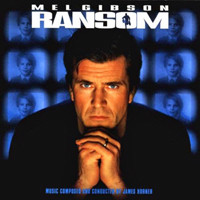- Composed by James Horner
- Hollywood Records / 73m (Horner score 48m)
Ron Howard’s Ransom starred Mel Gibson as a wealthy man whose son is kidnapped. Rather than paying the demanded ransom, he offers it as a bounty for the capture of the kidnappers and the return of his boy. Allowing him to play his signature angry intensity it was a perfect vehicle for Gibson and was surprisingly well-received at the time.
Ron Howard used to rotate between composers regularly and selected Howard Shore for Ransom. He got as far as recording his score before it was ditched and James Horner was brought in with just two weeks to write and record his score – a ridiculously short length of time but it wouldn’t be the first or indeed last time the composer would find himself in such a situation.

While it is entirely understandable in these circumstances that Horner would tread over very familiar ground, in truth I guess he would have done even if he’d had ten times as long to work on the film. The score is based almost entirely on the suspense music formula the composer came up with for Sneakers a few years earlier and later revisited many times, including in some parts of Howard’s previous film Apollo 13 and also notably in Clear and Present Danger and The Pelican Brief (amongst others).
Unlike all those other scores, this one doesn’t really have anything other than the suspense music – there’s no big theme here to offer relief from the tension. It’s the familiar wood block, snares, crashing cymbals and left-hand piano mixing with atmospheric strings almost from start to finish. It was a hugely effective film scoring technique, quite unlike how other film composers would tackle the same sort of material – but I guess only the staunchest Horner devotees (like me!) can stomach 48 minutes of it on an album.
While there is no big theme, there is a main theme and in fact it’s heard in nearly every track. There’s an angry version of it near the end of the very long “Delivering the Ransom”, and in the following cue “The Quarry” Horner uses fragments of it very dynamically over the score’s best action music, thrilling brass and percussion blasts dominating. The theme gets its biggest, warmest arrangement in the end titles, which appears at the end of a typically lengthy finale cue (“The Payoff”) whose earlier sections are dominated by some Aliens-style action which comes from nowhere but is very satisfying.
Elsewhere, there’s an interesting and colourful saxophone motif in the opening “The Kidnapper” which is done well; and the similarity to Sneakers is even greater in “A Two Million Dollar Bounty” when one of its very nice themes gets a brief airing.
Ransom is a perfectly good suspense score but if you’re one who gets annoyed by James Horner’s recycling then you should steer well clear because all of it is very familiar from earlier works. And as I suggested earlier, unlike in other scores whose suspense sections are similar to this one’s, there isn’t really something to offset them – Sneakers had so much going for it I won’t attempt to go into it (just read that review instead!) but even The Pelican Brief had the outstanding “Darby’s Theme”. (After Horner’s score there are 25 minutes of music by Billy Corgan of The Smashing Pumpkins… I will just say it is not to my taste.)
Rating: ***
Also see:
Sneakers James Horner
The Pelican Brief James Horner
facebook.com/moviewave | twitter.com/MovieWaveDotNet | amazon.com












It‘s quiet in here! Why not leave a response?